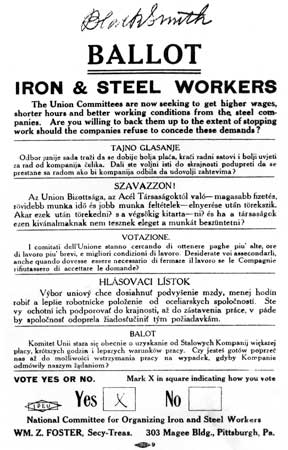talking history | syllabi | students | teachers | puzzle | about us
How do you spell strike?
Four million workers—one fifth of the nationís workforce—went out on strike in 1919, seeking to consolidate and expand the gains they had achieved during World War I and to make real the war’s rhetoric of democracy. The most important of these strikes began in September, when 350,000 steel workers walked off the job. Steel companies responded with a reign of terror, aided by local governments. Strikers were beaten, arrested, shot, and driven out of steel towns. Management brought in African-American and Mexican-American strikebreakers to split workers along racial and ethnic lines and tried to portray the conflict as an attempted revolution by foreign-born radicals. Eventually, the strike was broken. This strike ballot distributed by the National Committee for Organizing Iron and Steel Workers—printed in English, Croatian, Hungarian, Italian, Slovak, and Polish—indicated the range of nationalities composing the industry’s workforce in 1919.

Source: William Z. Foster, The Great Steel Strike and Its Lessons (1920)—American Social History Project.
